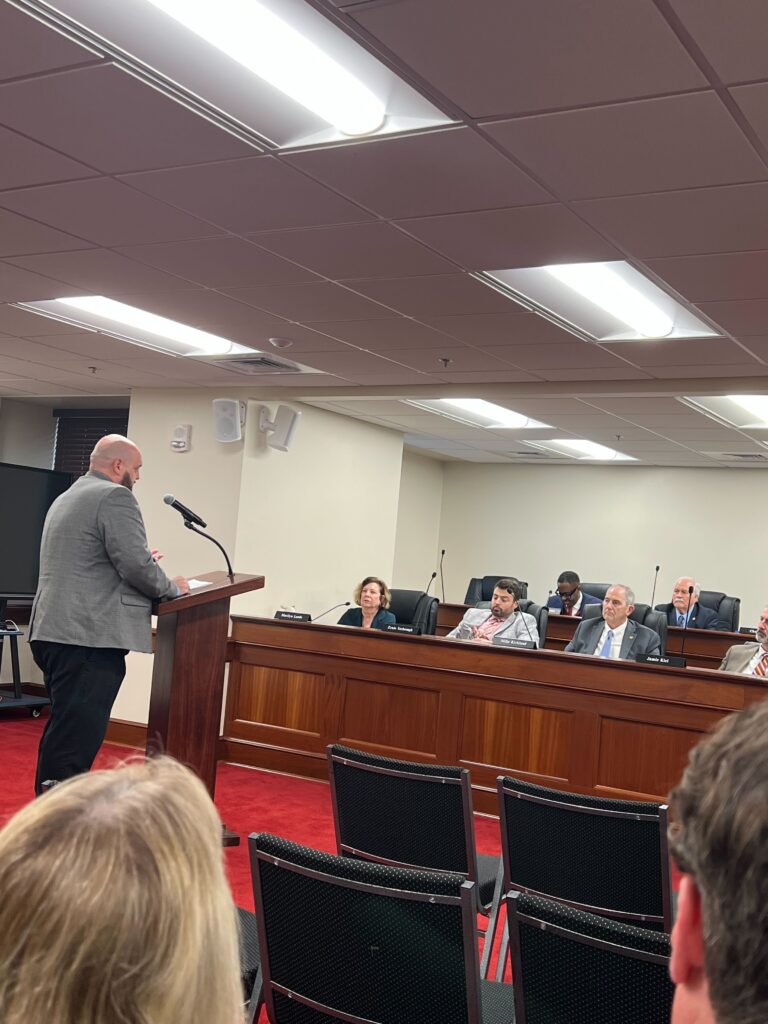Alabama Arise is advocating successfully to advance several good bills early in the Legislature’s 2025 regular session. Our members are speaking out and getting results on maternal health care access, paid parental leave and other issues.
The session began Feb. 4 and likely will end in mid-May. Here is an overview of Arise’s advocacy at the State House this year.
Maternal and infant health care
Both the House and Senate have voted overwhelmingly for legislation to improve Medicaid access for pregnant women. HB 89 by Rep. Marilyn Lands, D-Huntsville, and SB 102 by Sen. Linda Coleman-Madison, D-Birmingham, would use a process known as presumptive eligibility to streamline Medicaid enrollment for eligible women, allowing them to get health care earlier in their pregnancies.
We also have seen early momentum for bipartisan bills to ensure paid parental leave for teachers and state employees. HB 327 by Rep. Ginny Shavers, R-Leesburg, and SB 199 by Sen. Vivian Figures, D-Mobile, would provide eight weeks of paid leave for mothers and two weeks for fathers. The leave would apply to childbirth, adoption or miscarriage. Gov. Kay Ivey prioritized this policy in her State of the State address, and Arise strongly supports it.
Arise also supports bills to allow nursing mothers an exemption from jury duty and to improve Medicaid coverage for mothers facing postpartum depression. We back legislation to allow some women convicted of crimes to serve supervised probation during and immediately after pregnancy. And we support requiring employers to allow breaks for nursing mothers to express breast milk.
Adequate state budgets and public transportation
Medicaid expansion would help make health coverage affordable for all Alabamians, and it remains a top Arise budget priority. (See page 3.) We also oppose legislation to authorize junk health plans that could deny coverage for people with preexisting conditions. And we oppose federal efforts to slash Medicaid and food assistance to fund tax breaks for wealthy households. (See page 1.)
Arise is advocating for state funding to allow all public schools to provide universal free breakfast to every student if they choose. We are seeking to ensure ongoing support for Summer EBT benefits for more than 500,000 Alabama children, which our members’ advocacy secured last year. And we are working with other advocates to reform Alabama’s school funding formula, ensuring equitable public education for all students.
Arise was instrumental in creating state trust funds for public transportation and affordable housing. We are working with legislators on multiple possibilities to support these services.
Reforming Alabama’s upside-down tax system
Alabama reduced its state sales tax on groceries from 4% to 3% in 2023. Reducing the grocery tax further and ultimately eliminating it remains an important Arise goal. This may require amending the original legislation to phase in the next reduction sooner.
Arise supports good bills to end the state sales tax on infant formula, diapers and women’s hygiene needs. And we are closely monitoring the CHOOSE Act’s impact on education funding. Arise opposed the 2024 law, which will divert at least $100 million annually away from public schools and toward private schools and homeschooling.
Voting rights, criminal justice reform and death penalty reform
Voting is a fundamental way for people to make their voices heard. Arise opposes efforts to make it harder for people to exercise their right to vote. We support legislation to allow early voting, reduce barriers to absentee voting, and remove barriers to voting rights restoration for disenfranchised Alabamians.
Reforming criminal justice policies, including the death penalty, has been an Arise priority for many years. We are working to pass legislation improving the state’s broken parole system. We also back efforts to apply Alabama’s ban on judicial overrides of jury sentencing decisions in capital cases retroactively.

Workers’ rights and racial justice
Arise is committed to supporting safe workplaces and workers’ rights to organize. We support legislation allowing Alabama to recapture tax incentives from companies that violate child labor laws. We also support a bill to end state restrictions on local minimum wage increases. And we oppose legislation making it harder for people to receive unemployment insurance benefits after they lose their job.
The 2024 federal election has influenced state legislative priorities. Numerous state bills are targeting people without immigration documents and attacking efforts to advance racial equity and inclusion. Arise stands with our partners and friends in opposition to harmful bills in these areas.



